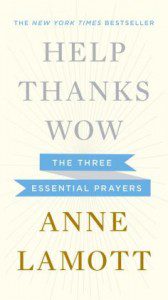This post is the first in a series of three posts inspired by Anne Lamott’s book Help, Thanks, Wow
 Anne Lamott is a social justice activist and bestselling author, known for her autobiographical books. I first encountered her through a book she published more than a decade ago titled Traveling Mercies: Some Thoughts on Faith, which helped establish her reputation as a provocative and hilarious writer on spirituality.
Anne Lamott is a social justice activist and bestselling author, known for her autobiographical books. I first encountered her through a book she published more than a decade ago titled Traveling Mercies: Some Thoughts on Faith, which helped establish her reputation as a provocative and hilarious writer on spirituality.
From that book, one of the lines that resonated most with me was her confession that, “Here are the two best prayers I know: ‘Help me, help me, help me,’ and ‘Thank you, thank you, thank you.’” Given the memorable resonance of that line, I wasn’t surprised that years later she expanded that one sentence into a short book titled, Help, Thanks, Wow: The Three Essential Prayers.
As a whole, I suspect many liberals are more comfortable with the final two of Lamott’s three prayers (“Thanks” and “Wow”) than with the first one (“Help”). The word “prayer” in general, for many people, implies that there is “Someone” or “some aspect of reality” that is affected, impacted, or changed by our prayers, and such claims trigger skeptical alarms for the dedicated rationalists among us.
And back when I was a Progressive Christian minister, one allowance I would make for such concerns, was to be intentional about directing attention to the aspect of our experience that we can control most directly: our actions. Thus, whenever I was asked to pray publicly, I would often insert some version of the following sentence (which is not original to me): “We trust your wisdom, God, concerning how our petitions are to be answered, and show us how we may contribute to alleviating the needs of those for whom we pray.” In other words, to quote a book title from the New Monastic Movement, the invitation is “Becoming the answer to our prayers.”
In that spirit, Pope Francis has awed the world — and was named Time Magazine’s “Person of the Year” — for not only praying to God, but more importantly practicing radical acts of loving kindness for the poor and marginalized. And this vital shift from praying for help to concrete acts of helping others in need invokes Pope Francis’ namesake and recalls the original twelfth-century “Prayer of St. Francis of Assisi,” a prayer, which challenges us even today to do our part to alleviate the needs of those for whom we pray. In the original St. Francis’ words:
Make me an instrument of Your peace;
Where there is hatred, let me sow love;
Where there is injury, pardon;
Where there is error, truth;
Where there is doubt, faith;
Where there is despair, hope;
Where there is darkness, light;
And where there is sadness, joy….
Grant that I may not so much seek To be consoled as to console;
To be understood as to understand;
To be loved as to love….
All this being said, however, my intention is not to duck the question of whether petitionary prayer “works.” Indeed, my observation is that even within the as-a-whole highly liberal Unitarian Universalist movement in which I am involved, many more UUs than you might think find praying for help to be comforting, even efficacious.
As a middle ground, however, I know that many religious progressives find the Quaker saying to be helpful: saying to someone in need that, “I’m holding you in the light.” Regarding the meaning of this saying, the Quaker singer-songwriter Carrie Newcomer writes that,
What is intended by this phrase is to let the person know that in your daily mediation you will hold them in your heart. When I sit in silent prayer or meditation I usually don’t have a lot to “say.” For me silent prayer or meditation is an opening. I open my heart and all the dark places and let in The Light. I try to tune my heart and ears to something other than the noise and distraction of the world. Often this feeling of opening stays with me and I feel it in the simplest moments of my day. So when I say, “I will hold you in the Light” it means I will daily open my heart and send my love and concern into the Light, into the living space around you.…
May we become the answer to our prayers.
May we become an instrument of Peace.
May we always hold one another in the Light.
The Rev. Dr. Carl Gregg is a trained spiritual director, a D.Min. graduate of San Francisco Theological Seminary, and the minister of the Unitarian Universalist Congregation of Frederick, Maryland. Follow him on Facebook (facebook.com/carlgregg) and Twitter (@carlgregg).
Learn more about Unitarian Universalism:
http://www.uua.org/beliefs/principles
















